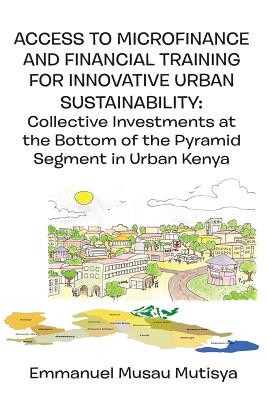
- We will send in 10–14 business days.
- Author: Emmanuel Musau Mutisya
- Publisher: Langaa RPCID
- Year: 2014
- Pages: 270
- ISBN-10: 995679287X
- ISBN-13: 9789956792870
- Format: 15.2 x 22.9 x 1.5 cm, minkšti viršeliai
- Language: English
- SAVE -10% with code: EXTRA
Access to Microfinance and Financial Training for Innovative Urban Sustainability. Collective Investments at the Bottom of the Pyramid Segment in Urban Kenya (e-book) (used book) | bookbook.eu
Reviews
Description
The Kenyan population is highly concentrated in urban centres, leading to increased social, economic and environmental strains, with a significant percentage of urban dwellers living in sprawling slums. Urban development is increasingly a major focus, especially in the fight against urban sustainability problems. There is little practical orientation in the academic literature for the growing gap between the rich and poor. Current literature is enormously concerned with resource use and environmental pressures, paying scant attention to the nexus between urban sustainability and empowerment of the urban poor. This book initiates debates on the segment of urban population often referred to as "the bottom of the pyramid (BOP)", by analysing the microfinance innovation following evaluation of the impacts of access to microfinance and financial training and the implications to urban sustainability in Kenya. The main conclusion reached is that microfinance has an instrumental role to play in promoting sustainable urban development as it supports social welfare improvement and increases the livelihood of participants, business development and urban sustainability to a certain extent, thereby empowering the urban poor in contributing to poverty alleviation.
EXTRA 10 % discount with code: EXTRA
The promotion ends in 22d.07:55:54
The discount code is valid when purchasing from 10 €. Discounts do not stack.
- Author: Emmanuel Musau Mutisya
- Publisher: Langaa RPCID
- Year: 2014
- Pages: 270
- ISBN-10: 995679287X
- ISBN-13: 9789956792870
- Format: 15.2 x 22.9 x 1.5 cm, minkšti viršeliai
- Language: English English
The Kenyan population is highly concentrated in urban centres, leading to increased social, economic and environmental strains, with a significant percentage of urban dwellers living in sprawling slums. Urban development is increasingly a major focus, especially in the fight against urban sustainability problems. There is little practical orientation in the academic literature for the growing gap between the rich and poor. Current literature is enormously concerned with resource use and environmental pressures, paying scant attention to the nexus between urban sustainability and empowerment of the urban poor. This book initiates debates on the segment of urban population often referred to as "the bottom of the pyramid (BOP)", by analysing the microfinance innovation following evaluation of the impacts of access to microfinance and financial training and the implications to urban sustainability in Kenya. The main conclusion reached is that microfinance has an instrumental role to play in promoting sustainable urban development as it supports social welfare improvement and increases the livelihood of participants, business development and urban sustainability to a certain extent, thereby empowering the urban poor in contributing to poverty alleviation.


Reviews